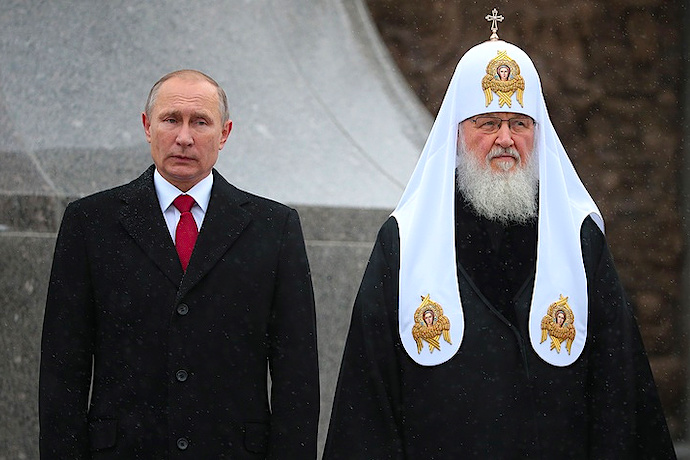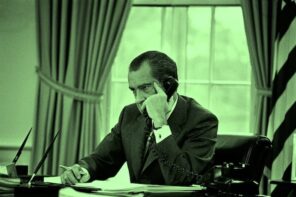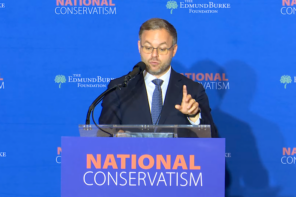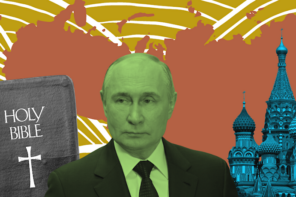Since the beginning of the Russian invasion of Ukraine, sanctions against Russian officials have been the most visible and powerful form of support offered by the global community to the Ukrainian people. These sanctions have targeted high-ranking Russian officials, oligarchs, and their families. Also, since nearly the beginning, when it became increasingly clear that the head of the Russian Orthodox Church, Patriarch Kirill of Moscow, was going to act as a mouthpiece for the Putin regime, there have been isolated calls to sanction the Patriarch and other leading Russian Church officials.
These calls have run parallel to calls to expel the Russian Orthodox Church (ROC) from the World Council of Churches. And while this should probably happen, it’s a course of action that will almost inevitably provide some kind of propaganda cover for the ROC as they play into Kirill’s position that he’s engaged in some sort of Holy War with the West, one in which he imagines himself as “the suffering servant,” excluded by fellow Christians who’ve lost the true faith.
But sanctioning Kirill and his co-conspirators might actually have a greater effect.
Economic and political sanctions make clear that the problem with Kirill isn’t primarily his theology, but his politics. The threat that Patriarch Kirill poses to the West isn’t because he seeks to baptize the secular order, as he would have you believe. He’s a threat because he’s allowed the Russian Church to become completely co-opted by the Kremlin.
It’s not completely unheard of for religious leaders to be sanctioned when they’re complicit in the sorts of things that get laypeople sanctioned. The Supreme Leader of Iran, Ayatollah Khamenei is currently under sanctions by the United States, as is the Jamaican-based Islamic cleric Abdullah Ibrahim al-Faisal.
That being said, the imposition of sanctions against Christian clerics is far less common, if not entirely non-existent. The US never placed sanctions on priests who cooperated with the various military dictatorships in Latin America or in Greece (if we’re looking for an Orthodox example). Even clerics who cooperated with the apartheid-regime in South Africa, arguably one of the most sanctioned governments ever, didn’t incur any personal penalties.
This discrepancy seems to suggest a part of the problem in the largely-Christian West’s response to the Russian Orthodox Church: Christian churches and clerics are given a much wider berth than Muslim clerics when it comes to supporting dangerous regimes and causes. There’s little doubt that if Patriarch Kirill were an ayatollah or a mullah there would be much less question about whether he should be held personally responsible for his complicity in an illegal and increasingly brutal war.
It’s also likely that there would be far greater public outcry for his moderate co-religionists to speak out against him—something always demanded of Muslims in analogous situations. Fortunately, even without public pressure, Orthodox Christians who know that Patriarch Kirill cannot speak alone for their tradition, are coming forward.
This includes the authors and signatories of the “Declaration on the “Russian World” (Russkii mir) Teaching,” a condemnation of the core ideological and theological propositions being put forward by Kirill and his cronies. There are the parishes in Western Europe refusing to commemorate Kirill and breaking with Moscow. And most importantly, the brave priest within Russia speaking out against their chief bishop’s proclamations. These dissenters and others like them represent “the other side” of the internal conflict within Orthodox Christianity.
And it’s not just scholars and clerics; there are also ordinary laypeople, many of whom have largely sat out Orthodoxy’s recent ideological battles, who are now feeling compelled to act.
Nadya Bodansky, a Russian-born lawyer, came to the United States thirty years ago. She describes herself as “an ordinary Orthodoxy Christian appalled by the actions of the Russian Orthodox Church.” Concerned by the lack of public discourse about sanctioning Kirill and senior Russian clerics, she started a Change.org petition calling for these sanctions.* Bodansky tells Religion Dispatches, “Unfortunately I don’t have a good platform that would allow me to reach a wide audience with this, so I am afraid it will just remain a symbolic gesture on my part…at least I will know that I did what I could.”
Sanctions against clerics are usually largely symbolic gestures. It’s highly unlikely that either the Supreme Leader of Iran or the Patriarch of Moscow had plans to turn up at Disneyland this summer. But that’s beside the point, because symbols matter. Sanctioning Patriarch Kirill and his fellow clerical enablers of Vladimir Putin would be a powerful symbol. One that ought to be deployed.
###
*Full disclosure: Just as in the case of the Russian world heresy, I have signed this petition in my private capacity as a practicing Orthodox Christian concerned for the spiritual health of my church.





